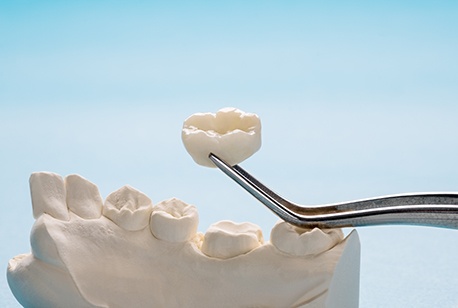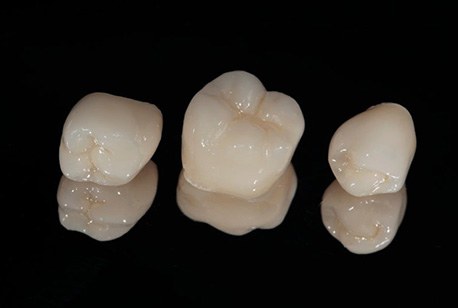Dental Crowns – Loveland, OH
A Lifelike Way to Restore Damaged Teeth
If you have decayed or damaged teeth, it’s important to treat them sooner rather than later to avoid potential problems, like additional injuries, disease, or infection that can hurt your dental health. Fortunately, our Gerome & Patrice Family Dentistry team has a lifelike way to restore damaged teeth with dental crowns.
These tooth-shaped caps can simultaneously rebuild your smile’s appearance and functionality to improve your daily quality of life. Continue reading to learn more about them, and please don’t hesitate to contact us with any additional questions.

Why Choose Gerome & Patrice Family Dentistry for Dental Crowns?
- Dentists with Decades of Combined Experience
- Lifelike, Customizable Materials
- Flexible Financial Plans & In-House Memberships Available
What is a Dental Crown?

Dental crowns are usually made from resilient, tooth-colored porcelain that can be customized to match the size, shape, and hue of your natural teeth for seamless results. Then, they’re cemented over your damaged tooth to protect it from further harm and allow you to continue using them normally.
However, that’s not the only reason our team might recommend this treatment. These restorations are a versatile solution that can also be used to:
- Cap a dental crown or anchor a dental bridge to close the gaps in your grin.
- Shield a tooth that underwent a root canal procedure.
- Reshape worn-down teeth.
- Preserve injured teeth that might otherwise require extraction and replacement.
The Dental Crown Process

Although this service can potentially benefit patients in many different ways, that doesn’t mean it’s automatically the best solution to meet everyone’s unique needs. Before proceeding, you must consult with one of our providers in Loveland to ensure you’re a good candidate. We’ll also use this initial appointment to examine your mouth to determine whether any other services, like filling cavities, addressing gum disease, or performing a root canal, are required based on your current condition.
Then, if you’re approved to move forward, we’ll prepare the affected tooth by removing a small amount of enamel so your crown fits correctly. Then, we’ll make impressions of your teeth and gums to send to a dental laboratory to design your dental crown to fit like a glove. It can take a couple of weeks for them to deliver the finished product, so we’ll likely fit you with a temporary restoration to safeguard your smile until it arrives.
Once we receive your dental crown, we’ll contact you to schedule a final fitting before cementing it in place, removing excess bonding material, and polishing it to a shine.
The Benefits of Getting a Dental Crown

There are several advantages of getting a dental crown in Loveland, including:
- Long-lasting results. These covers can last 15+ years if cared for correctly.
- Easy maintenance. Keeping it in good shape is as easy as brushing and flossing twice daily, and visiting our team every six months for a routine checkup and cleaning.
- The ceramic material is less porous than enamel and is therefore less likely to develop stains, chips, or cracks.
- Boosted confidence. They are customized to look and feel as lifelike as possible to improve your self-esteem.
- Versatility. These restorations can be used in a variety of ways to support your oral health and improve your appearance.
Understanding the Cost of Dental Crowns

Dental crowns may be the best way to restore or beautify your teeth, but it’s still perfectly reasonable to ask how much these devices will cost before you receive them. While we cannot give you a proper cost estimate before we see you at our office in Loveland for your consultation, there are a few factors that can give you a fair idea of what you can expect to pay. Here’s a brief guide to how crowns are normally priced from the team at Gerome & Patrice Family Dentistry.
Factors That Affect the Cost of Dental Crowns

Each dental crown is unique, so the price of one appliance can differ significantly from that of another. Several factors make up most of the cost of a dental crown, and these are:
- The severity of the damage: Teeth that are more severely decayed usually require larger crowns. Larger crowns are more expensive since they require more material.
- The material: Crowns are traditionally made from metal, but the team at Gerome & Patrice Family Dentistry places restorations made from lifelike dental porcelain.
- Preliminary procedures: Oral infections like tooth decay and gum disease must be resolved before a dental crown can be placed, and the cost of the procedures needed to do this will be noted on your bill.
- The method of manufacture: Traditional dental crowns may cost less than same-day restorations.
Does Dental Insurance Cover Dental Crowns?

Dental insurance usually covers dental crowns and many of the preliminary procedures they may require by 50% to 80%. However, each policy is unique, so your plan may cover crowns and restorative work differently. During your consultation, we’ll be happy to help you navigate your insurance policy so you can know exactly what it will pay for before treatment begins.
Options for Making Dental Crowns Affordable

We understand that many people are uninsured or underinsured, and we’re eager to ensure that each of our patients can access the care they need to stay healthy. To help make dental crowns affordable, we offer options like:
- Flexible financing: We partner with CareCredit to give our patients payment options that can break their bills into low monthly payments with little to no interest.
- Kleer Dental Membership Plan: For $31 a month, you can have your routine dental care covered, receive one emergency exam, and enjoy a 15% discount on all other procedures at our practice.
During your consultation, we’ll be happy to help you understand the estimated cost of your treatment as well as your insurance and financing options.
Dental Crown FAQs
How Long Do Dental Crowns Last?
Typically, you can expect your tooth-shaped cap to last anywhere from 5 to 15 or more years, though it depends significantly on your unique circumstances and habits. For example, crowns placed over molars may wear down and require replacement sooner than ones over front teeth because they sustain additional pressure from biting and chewing.
You can keep them in good condition by:
- Brushing and flossing twice daily to remove plaque and bacteria that erode the underlying tooth.
- Avoid darkly pigmented foods that can eventually cause stains and steer clear of hard, crunchy snacks that can chip or crack them.
- Wear a nightguard or mouthguard to protect your teeth from the pressure of constantly clenching or sustaining injuries.
- Visit our team every six months for a checkup and cleaning so we can monitor your condition to catch and treat any areas of concern before they progress.
What’s the Difference Between a Temporary Dental Crown and a Permanent One?
Our team must remove a small amount of enamel from your tooth for your prosthetic to fit correctly, which leaves it somewhat more vulnerable to additional decay, damage, or disease. Because it can take the dental laboratory a couple of weeks to finish building your dental crown, we’ll likely fit you with a temporary version to shield your smile while you wait.
This cover isn’t intended to last as long as the final version, so they’re usually made from less permanent materials, like acrylic or composite resin. Furthermore, because they’re only meant to be worn for a couple of weeks, they aren’t customized as fully as the final restoration.
We’ll also cement it in place using a slightly weaker bonding material that’s easier to dissolve, so we can remove the temporary crown to place the permanent once it’s been delivered.
Does Getting a Dental Crown Hurt?
It’s only natural to feel anxious if you’re worried that getting a dental crown might hurt, but thankfully, that’s not usually the case. First, we’ll apply a local anesthetic before preparing your tooth for this treatment so that you feel pressure while we work, but not pain.
Then, you might feel some sensitivity once we’ve thinned your enamel and again once the permanent crown is placed, due to the bonding cement. This is usually temporary and resolves itself after a few days, though taking Tylenol or ibuprofen can typically safely reduce any associated aches.
If you experience severe or persistent discomfort, please let us know. We may need to examine your mouth to ensure your dental crown fits correctly and can make adjustments as needed.
Can I Still Get Cavities When I Have a Dental Crown?
Your restoration isn’t made from the same organic materials as your enamel, so you don’t have to worry that it will develop cavities. However, the underlying tooth and your other remaining teeth and gums are still susceptible to common oral issues, like tooth decay and gum disease.
Fortunately, this can be avoided by implementing a twice-daily dental hygiene regimen of brushing for two minutes followed by flossing to remove plaque and bacteria buildup.
Will Dental Insurance Cover the Cost of My Dental Crown?
Many dental insurance policies cover anywhere from 50% to 80% of the price of repairs needed to protect and preserve your smile, like dental crowns. However, every plan is different, and there is no guarantee your treatment is included, so it’s worth verifying your information. You may also want to determine whether there are other restrictions, like an annual deductible or a waiting period, that must be met before benefits kick in.
Please let us know if you would like help finding the information or submitting claims or forms. Our friendly office staff is familiar with many insurance providers and are happy to help you maximize your available benefits.

